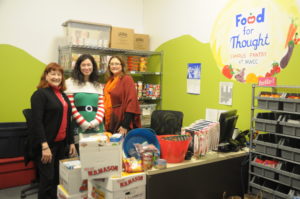
Mount Wachusett Community College’s Food for Thought Campus Pantry is one of the first college food pantries to partner with the Worcester County Food Bank (WCFB) in addressing food security on local college campuses.
The partnership is a step toward ensuring students have consistent access to the food they need. It also helps sustain the pantry as a resource for students, according to Shelley Errington Nicholson, the director of the Brewer Center for Civic Learning & Community Engagement who oversees operation of the food pantry. WCFB provides a steady stream of good food, at no cost, to the pantry – and the pantry, in turn, provides food at no cost to students. Donations from WCFB will help round out those the pantry already receives from elsewhere in the community.
“Hunger can show up anywhere, including on college campuses. Our partnership with campus pantries, and Mount Wachusett Food for Thought specifically, is a strategic way to decrease hunger in Worcester County. Working with Shelley and her team has been fun and informative. It is clear that they are passionate about increasing access to food for their campus community while decreasing the stigma that can be attached to asking for help,” said Worcester County Food Bank’s Agency Relations Manager Seana Weaver.
The Food for Thought Campus Pantry was created in October of 2017 by students in response to food insecurity among community college students, which is becoming an increasing threat to student success.
“Our students work so hard to be here and we look at the food pantry as another in a long line of services MWCC offers to ensure students are successful,” said Nicholson. “We are honored and humbled to be working with the Worcester County Food Bank. In addition to the resources this allows us to tap into, the support of the wider community sends a positive message to our students.”
The food pantry is an outgrowth of the student-service focus of MWCC, which also features such services as Students Serving Our Students (SOS). Students involved with the SOS program took it upon themselves to do something about this issue by opening the food pantry in October of 2017. The on-campus location with student-friendly hours is a first for the college.
“Being an SOS member and working at the food pantry has had a positive impact on me. It has helped me be able to reach out to students in the college and tell them where food is available and it has helped me be able to gain more experience and confidence working with not only students but staff members as well. It is definitely a good stepping stone for my future career,” said MWCC student Justyce Gomez.
In the first 16 months the pantry was open, 7,238 pounds of food and 15,807 total items (including items such as personal hygiene products) were distributed. In the fall 2018 to 2019 semester alone, 3,175.5 pounds of food were distributed to students through the pantry, with 47 students using the pantry on a regular basis. Students who made use of the food pantry had a retention rate from the Fall of 2018 semester to Spring of 2019 semester of 77.5 percent.
Research makes clear community college students experience higher food insecurity than the rest of the population, according to Nicholson. The Wisconsin Hope Lab recently released data from their 2017 study on food insecurity and homelessness in which they surveyed over 33,000 students at 70 community colleges in 24 states. The results from the study found two out of three community college students are food insecure.
Worcester County Food Bank (WCFB) provides donated food to a network of 118 Partner Agencies, including food pantries, community meal programs and shelters. Its mission is to engage, educate and lead Worcester County in creating a hunger-free community. Last year, WCFB – through its Partner Agencies – served 81,000 neighbors.

